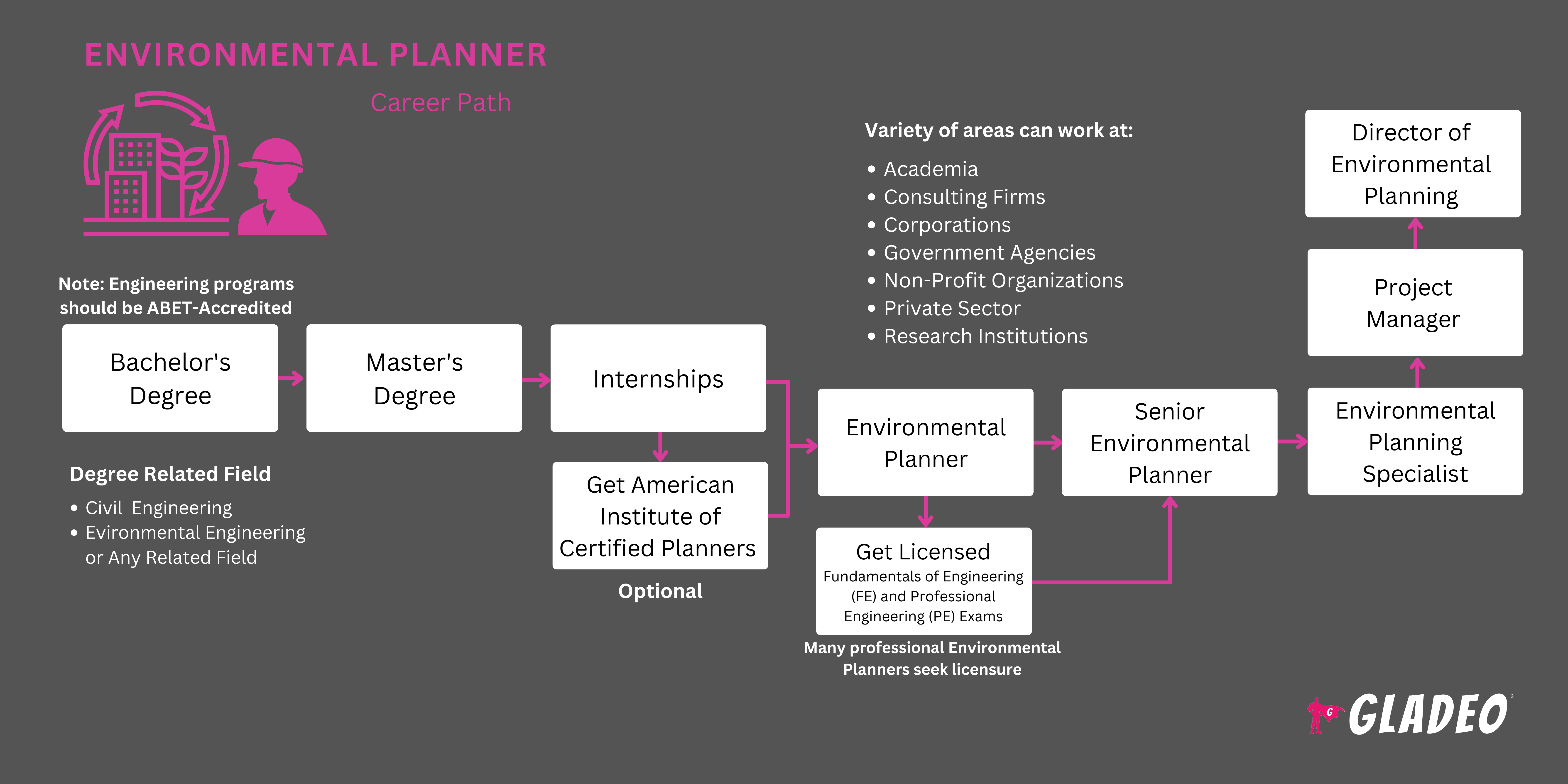Focos
Especialista en planificación medioambiental, planificador de sostenibilidad, planificador de uso del suelo, planificador de recursos naturales, analista de impacto medioambiental, planificador de infraestructuras ecológicas, planificador de resiliencia climática, analista de políticas medioambientales, planificador de conservación, planificador de terrenos ecológicos, especialista medioambiental.
A lo largo de la dilatada existencia humana, hemos dedicado la mayor parte de nuestro tiempo a buscar formas de explotar los abundantes recursos naturales de la Tierra. Sin embargo, en las últimas décadas, los científicos se han dado cuenta de que hemos ido demasiado lejos. Desde la contaminación del aire y el agua hasta la deforestación, nuestras acciones han causado tanto daño que estamos haciendo que nuestro propio mundo sea menos habitable para nosotros y para las generaciones futuras.
Para empeorar las cosas, el calentamiento global está calentando nuestra atmósfera, lo que contribuye a los cambios climáticos que han provocado un aumento de la frecuencia de los desastres naturales. Por todas estas razones, ha surgido un nuevo campo profesional en un esfuerzo por salvar el planeta: ¡la planificación medioambiental! Los planificadores medioambientales son expertos en sostenibilidad que trabajan en estrecha colaboración con organismos gubernamentales y organizaciones privadas para ayudar a mitigar los impactos negativos sobre nuestro entorno, cada vez más frágil. Su importante labor protege todo, desde la vida vegetal y animal hasta nuestra propia calidad de vida, al salvar nuestro aire, agua y tierra de la contaminación nociva.
- Trabajar en un sector dedicado a ayudar al medio ambiente.
- Potencialmente salvando vidas y mejorando la calidad de vida de las comunidades.
- Adquirir experiencia en un sector preparado para crecer en los próximos años.
Horario de trabajo
- Los puestos de planificador medioambiental suelen ser a tiempo completo y la mayor parte del trabajo se realiza en interiores. Sin embargo, algunos puestos implican visitar físicamente los lugares donde se están aplicando los planes de mejora medioambiental. Esto puede incluir desplazamientos a instalaciones relacionadas con el agua potable, las aguas residuales, el suelo o incluso los vertederos.
Funciones típicas
- Analizar las áreas de recursos naturales y evaluar los riesgos.
- Revisar los posibles impactos ambientales de los proyectos de construcción propuestos.
- Gestionar o analizar proyectos y presupuestos de planificación medioambiental.
- Trabajar en estrecha colaboración con arquitectos, contratistas y funcionarios gubernamentales.
- Visitar las obras del proyecto para garantizar el cumplimiento de las normativas y políticas. Supervisar el trabajo en algunos casos.
- Ayuda en la tramitación de permisos
- Recopilar y estudiar datos técnicos.
- Genere informes con gráficos o imágenes, según sea necesario.
- Mantener la documentación
- Ayudar con asuntos comerciales tales como solicitudes de propuestas, solicitudes de información, propuestas de los Departamentos de Transporte y otros.
- Revisar las directrices de la Ley Nacional y Estatal de Política Ambiental (NEPA y SEPA).
Responsabilidades adicionales
- Informar de los resultados internamente y a los organismos pertinentes.
- Manténgase al día sobre las leyes, códigos, reglamentos y estudios pertinentes en materia de medio ambiente.
Habilidades sociales
- Capacidad para supervisar y evaluar objetivamente el rendimiento de las personas, los sistemas y los equipos.
- Compromiso con la garantía de calidad
- Resolución de conflictos
- Pensamiento crítico
- Habilidades de atención al cliente
- Orientado a los detalles
- Dominio del inglés
- Mentalidad ética y medioambiental
- Orientado a la investigación
- Con mentalidad de seguridad
- Buen juicio y razonamiento
- Fuertes habilidades de comunicación verbal y escucha.
- Trabajo en equipo
Habilidades técnicas
- Capacidad para comprender planos, planos técnicos y dibujos.
- Cómodo para trabajar al aire libre
- Aptitud física y destreza
- Conocimientos normativos
- Familiaridad con el software de gestión de proyectos.
- Organismos gubernamentales
- Empresas y organizaciones privadas
Los planificadores medioambientales trabajan tanto en interiores como en exteriores. En ocasiones, pueden encontrarse con situaciones conflictivas si un empleador está ansioso por llevar a cabo un proyecto de construcción, pero existen riesgos medioambientales que ponen en peligro esos planes. Los planificadores medioambientales deben ser mentalmente resilientes y capaces de mantener su objetividad mientras desempeñan sus funciones con diligencia, especialmente en momentos en los que surgen desacuerdos o disputas. En primer lugar, es su deber garantizar el cumplimiento y defender las normas diseñadas para proteger el medio ambiente.
Parece haber una interminable serie de peligros provocados por el hombre que azotan nuestro planeta cada día, agravando los problemas medioambientales y relacionados con el cambio climático. Algunas prioridades ecológicas urgentes prioridades ecológicas han acaparado la atención de los planificadores medioambientales en los últimos años.
Entre ellas se encuentra el deseo de impulsar las fuentes de energía renovables, como la solar y la eólica, al tiempo que se intenta reducir el uso del carbón. Al mismo tiempo, el Gobierno sigue impulsando una reducción general del consumo energético, en parte fomentando el desarrollo de tecnologías y prácticas más eficientes.
Los planificadores medioambientales también pueden esperar trabajar en la búsqueda de formas de aumentar el reciclaje de plástico para ayudar a reducir la contaminación marina. Otra área de preocupación relacionada con el agua es la gestión de los desechos humanos, con los riesgos para la salud que se acumulan en todo el mundo a medida que se propagan las enfermedades transmitidas por el agua. Una fuente de problemas menos conocida es el cemento, que emite aproximadamente el 8 % del total de carbono del mundo.
Los planificadores medioambientales suelen ser naturalistas que aprecian la belleza de nuestro planeta, tan diverso como frágil. En su juventud, es posible que disfrutaran realizando actividades físicas al aire libre, pero quizá se dieron cuenta de cómo el comportamiento humano ha afectado negativamente a los ecosistemas naturales. ¡Son personas que quieren que su trabajo marque una diferencia notable en nuestro mundo!
- Los planificadores medioambientales deben tener al menos una licenciatura en un campo adecuado, como ingeniería civil o medioambiental. Los programas de ingeniería deben estar acreditados por la ABET.
- Muchos estudiantes completan una maestría en planificación, planificación ambiental o gestión ambiental.
- Otras opciones importantes incluyen ciencias ambientales, gestión ambiental, sostenibilidad o planificación regional.
- Las clases comunes pueden incluir:
- Áreas antropológicas
- Diseño
- Ecología
- Derecho ambiental
- Geología
- Sistemas hidrológicos
- Diseño de interiores
- Gestión del territorio
- Planificación paisajística
- Matemáticas
- Conservación y restauración
- Desarrollo rural y urbano
- Sociología
- Estadísticas
- Sostenibilidad
- Movimiento del agua
- Los estudiantes pueden adaptar sus cursos para que se ajusten a un área de especialización.
- Las prácticas pueden proporcionar valiosas experiencias prácticas en las que los estudiantes pueden aprender mientras trabajan para una empresa o agencia.
- Certificaciones opcionales como la del American Institute of Certified Planners pueden hacer que los graduados sean más competitivos en el mercado laboral.
- Muchos planificadores medioambientales profesionales obtienen la licencia tras aprobar el examen Fundamentos de Ingeniería (FE) y examen de Ingeniería Profesional (PE).
Los estudiantes que deseen obtener un título en ingeniería deben buscar programas que estén acreditados por ABET. Lo ideal es que el profesorado de su programa tenga una sólida formación en su campo, incluida la experiencia laboral práctica.
U.S. News & World Reports enumera varias políticas medioambientales y de gestión bien valoradas programas universitarios de política y gestión medioambiental . Aunque la lista no es exhaustiva, puede servir como un buen punto de partida para su búsqueda.
- matemáticas, geología, sociología, estadística, clases de diseño y cualquier asignatura optativa relacionada con el medio ambiente.
- Adquiera experiencia laboral práctica a través de oportunidades de aprendizaje en Apprenticeship.gov
- Considera la posibilidad de hacer voluntariado en proyectos de Hábitat para la Humanidad que pueden implicar consideraciones medioambientales.
- ¡Acostúmbrate a leer cosas difíciles! Fórmate a través de libros, revistas, artículos en línea, estudios y políticas.
- Vea vídeos relacionados en YouTube y otros sitios web para obtener más información sobre el campo de la planificación medioambiental.
- Busque organizaciones profesionales que ofrezcan oportunidades educativas y de networking (véase sitios web recomendados más abajo).

- Portales de empleo como Glassdoor, Indeedo SimplyHired suelen ser los mejores puntos de partida para encontrar trabajo.
- Pide ayuda al director del programa universitario o al personal de orientación profesional de tu centro educativo. ¡Es posible que tengan contactos directos con reclutadores locales!
- Selecciona cuidadosamente los anuncios de empleo para asegurarte de que cumples con los requisitos y tienes la experiencia adecuada.
- Echa un vistazo a plantillas de currículum de planificador medioambiental para obtener ideas sobre tu propio currículum.
- Céntrate en tu currículum en las experiencias y habilidades laborales y académicas relevantes, e intenta cuantificar los datos siempre que puedas.
- Mantén una presencia profesional en las redes sociales, ya que los empleadores te buscan en Internet.
- Practique entrevistas simuladas y revise ejemplos preguntas de entrevista para planificadores medioambientales.
- Habla con tus antiguos supervisores o profesores para ver si estarían dispuestos a servir como referencias personales.
- Los planificadores medioambientales suelen empezar en puestos de nivel inicial y van ascendiendo gracias a su esfuerzo y a aprender todo lo que pueden.
- Elimina cualquier trabajo adicional o formación que te sugiera tu empleador.
- Domine el equipo y los sistemas con los que trabaja, y estudie los materiales proporcionados por el fabricante.
- Conviértete en certificado por NABCEPy/o complete las certificaciones básicas y avanzadas opcionales cuando tenga la experiencia mínima necesaria.
- Obtener licencia estatal, según corresponda.
- Habla con tu supervisor sobre los ascensos a supervisor o director de proyectos.
Sitios web
- Instituto Americano de Geociencias
- Instituto Americano de Planificadores Certificados
- Asociación Americana de Planificación
- Ríos estadounidenses
- Sociedad Ecológica de América
- Instituto de Medio Ambiente y Recursos Hídricos
- Asociados en Ciencias Ambientales
- Instituto de Gestión de Materiales Peligrosos
- Revista de la Asociación Americana de Planificación
- Asociación Nacional de Salud Ambiental
- Administración Nacional Oceánica y Atmosférica
- Red de Planificadores
- Revista de planificación
- Sociedad para la Restauración Ecológica
- Sociedad de Silvicultores Americanos
- Sociedad de Científicos de Humedales
- UCAR
Libros
- Planificación del uso del suelo para el desarrollo sostenible, por Jane Silberstein M.A. y Chris Maser
- NEPA y planificación medioambiental, por Charles H. Eccleston
- El Manual de Planificación Ambiental: Para Comunidades y Regiones Sostenibles, por Tom Daniels
El mundo necesita planificadores medioambientales en primera línea, que ayuden a garantizar la protección de nuestro planeta frente a peligros nocivos. Sin embargo, para aquellos que tengan un interés general en este campo, pero quieran considerar otras opciones, aquí hay una breve lista de alternativas relacionadas:
- Especialistas en reurbanización de terrenos industriales abandonados y gestores de obras
- Cartógrafo
- Científicos conservacionistas
- Científicos y especialistas en medio ambiente
- Geógrafo
- Ecólogos industriales
- Fotogrametrist
- Gerentes de rango
Fuente de noticias

Empleos destacados

Cursos y herramientas en línea

Expectativas salariales anuales
Los nuevos trabajadores comienzan con un salario de alrededor de 110 000 dólares. El salario medio es de 113 000 dólares al año. Los trabajadores con mucha experiencia pueden ganar alrededor de 140 000 dólares.
Expectativas salariales anuales
Los nuevos trabajadores comienzan con un salario de alrededor de 106 000 dólares. El salario medio es de 137 000 dólares al año. Los trabajadores con mucha experiencia pueden ganar alrededor de 146 000 dólares.
Expectativas salariales anuales
Los nuevos trabajadores comienzan con un salario de alrededor de 103 000 dólares. El salario medio es de 112 000 dólares al año. Los trabajadores con mucha experiencia pueden ganar alrededor de 139 000 dólares.
Expectativas salariales anuales
Los nuevos trabajadores comienzan con un salario de alrededor de 89 000 dólares. El salario medio es de 107 000 dólares al año. Los trabajadores con mucha experiencia pueden ganar alrededor de 136 000 dólares.
Expectativas salariales anuales
Los nuevos trabajadores comienzan con un salario de alrededor de 88 000 dólares. El salario medio es de 108 000 dólares al año. Los trabajadores con mucha experiencia pueden ganar alrededor de 133 000 dólares.







